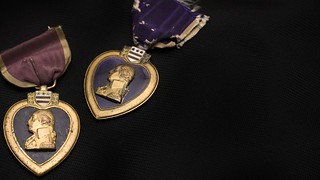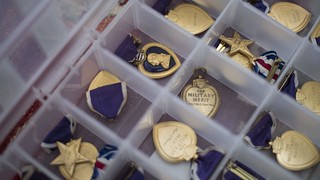
PREV ARTICLE
NEXT ARTICLE
FULL ISSUE
PREV FULL ISSUE
THE PURPLE HEART DETECTIVE: ZACHARIAH FIKEFor the other side of the story on legislation concerning the Purple heart medal, the BBC News has an excellent, lengthy article about Major Zachariah Fike, the veteran behind
the proposal. Thanks to Dick Hanscom for sending this. -Editor
For him, the solution was to collect antiques - he enjoyed the thrill of searching for lost treasure. Sometimes he came across military items - helmets, uniforms, medals. It bothered him to see them lying around, so he started buying them up. Fike, aged 35, comes from a long line of soldiers. His parents met in the army. His grandfather was a World War Two veteran who would drive hitchhiking soldiers all the way home, even if it meant going 100 miles out of his way. So it was no surprise that Fike was drawn to military memorabilia. But his feelings about this trade changed in 2009, when his mother, Joyce, presented him with a very special Christmas gift - a Purple Heart. America's oldest military award, the Purple Heart started out as a cloth patch in the shape of a heart, pinned to the chest of Revolutionary War soldiers by General George Washington himself. Later it became a heart-shaped medal, decorated with the bust of Washington, and given to those wounded or killed in battle. "It's one of those awards that most soldiers don't want because it means that you've been struck by enemy fire or you've lost your life," says Fike. "So it's very special." The one Joyce had bought for $100 in an antique shop near her home in upstate New York was engraved "For Military Merit, Corrado A.G. Piccoli". It came in a little case with the dog tags all soldiers carry so they can be identified if they die in battle. "When I saw it, I knew it didn't belong to me," says Fike. "It symbolises an individual who's shed their blood or their life for a cause, for their country. That shouldn't be in somebody's personal collection. It should be with that family or in a place of honour." He started digging around in archives to find out what he could about the man who had earned the medal, and learned that Private Corrado Piccoli had enlisted in January 1943, shortly after graduating from high school, and had died in France on 7 October 1944. Fike also found Piccoli's home address and discovered he had six brothers and sisters. In January 2011 he picked up the trail again, driving up to Watertown, near his mother's home, to visit Piccoli's old high school. There, in the 1942 yearbook, he spotted the picture of an earnest young man wearing glasses and a tie. "Immediately he became a person, he became real," says Fike. Later that day he met a nun who told him that one of the Piccoli sisters, Mary, still lived in town. The story of Corrado Piccoli and his Purple Heart was broadcast on the news, and the next morning Fike started receiving phone calls from all over the country. Medals had been found in abandoned homes, vehicles, furniture - one had even been dug up in a backyard by a dog. It was going to be a lot of work, so Fike decided to set up a non-profit organisation, Purple Hearts Reunited, to return lost or stolen medals to veterans or their families.
This year Fike was named Soldier of the Year by the Military Times, but not everyone regards him as a hero - to medal collectors he is a menace. Purple Hearts are valuable collector's items, and Fike has been campaigning to stop them from being bought and sold. "Believe it or not, there's millions of collectors across the country and even overseas that actively pursue these medals and they collect them, trade them, like baseball cards," says Fike. He feels this is wrong - just as he did when he held Corrado Piccoli's Purple Heart in his hand the first time. "Early on I was very verbal about how I thought it was deplorable to make a profit off anyone that sacrificed their life," says Fike. "It's a national symbol that symbolises someone that shed their blood or gave their life and we should respect that. Who would argue that laying down your life is not the greatest act?" He has even helped bring about a bill - The Private Corrado Piccoli Purple Heart Preservation Act. It does not ban anyone from owning such medals, just from profiting from their sale. The idea has dismayed many collectors, who fear the ban could drive the trade underground or abroad and erode public knowledge of military history. But Fike doesn't buy it. "Some of them will say, 'We want to preserve history, we're not here to make a profit.' But if you buy a medal for $50 and then find out the man fought at Iwo Jima and you turn around and sell it for $750, you're making a profit," he argues. Even when he knows the soldier's family sold the medal, Purple Hearts Reunited still "rescues" it, he says, "because we still don't believe that the medal should be in somebody's private collection". Sometimes he sees a medal in a collection online, finds the family it belongs to, then asks the collector to sell it to him for whatever they paid for it, so that he can return it. But many collectors won't deal with Fike directly, and he now has to rely on intermediaries. His "rescue team" are continually buying medals from online auction sites - last year alone they spent $50,000 (£40,000) on 125 medals. The average posthumous Purple Heart medal on the open market goes for about $300 (£240), but if it has some historical significance it could go for thousands. As I've said before, I very much understand the well-meaning position those behind the law are taking. I still think it's misguided. Many of these medals will be returned
only to be lost again by future descendants. Collectors provide a valuable service in saving, researching and protecting them. And if in the future a recipient's descendants want to reclaim the
medal, it will be documented and available. -Editor
To read the complete article, see: To read the earlier E-Sylum articles, see: THE BOOK BAZARREWayne Homren, Editor The Numismatic Bibliomania Society is a non-profit organization promoting numismatic literature. See our web site at coinbooks.org. To submit items for publication in The E-Sylum, write to the Editor at this address: whomren@gmail.com To subscribe go to: https://my.binhost.com/lists/listinfo/esylum All Rights Reserved. NBS Home Page Contact the NBS webmaster 
|

